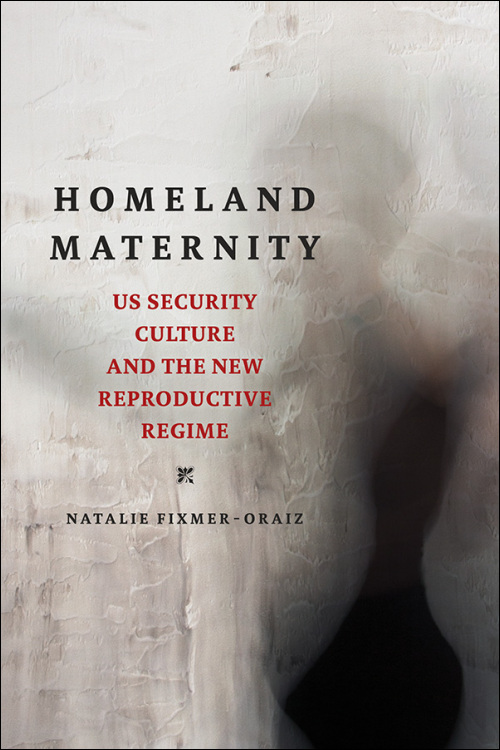Associate Professor Natalie Fixmer-Oraiz’s recent book, Homeland Maternity: U.S. Security Culture and the New Reproductive Regime, brings attention to the harmful correlation between national security and the curtailment of reproductive rights in the United States.
In recognition of this significant publication, the National Communication Association (NCA) has awarded Fixmer-Oraiz the prestigious James A. Winans-Herbert A. Wichelns Memorial Award for Distinguished Scholarship in Rhetoric and Public Address. Fixmer-Oraiz has appointments in the University of Iowa Departments of Communications Studies and Gender, Women’s, and Sexuality Studies.
Homeland Maternity: U.S. Security Culture and the New Reproductive Regime, by Associate Professor Natalie Fixmer-Oraiz, has won the National Communication Association's James A. Winans-Herbert A. Wichelns Memorial Award for Distinguished Scholarship in Rhetoric and Public Address.
"Fixmer-Oraiz powerfully articulates how reproductive justice and homeland maternity provide scholars and activists the vocabularies and interpretive frameworks to interrogate and disrupt dominant mechanisms that are used to police individuals' reproductive lives. Homeland Maternity is intellectually rigorous, forceful, and timely to the current sociopolitical context. It can and should inform future studies in rhetoric, media studies, and gender and women's studies." —Women's Studies in Communication
Published by the University of Illinois Press in March 2019, Fixmer-Oraiz’s book discusses how nonreproductive and “overly” reproductive people have been positioned as threats to national security and American social norms. When asked how this book relates to current events, Fixmer-Oraiz stated: “Sadly, reproductive violence and injustice are not rare. The recent whistleblower account of sterilization abuse of immigrant women in ICE detention is a devastating example of what I mean by homeland maternity, which is a white supremacist logic that authorizes control over pregnant and parenting people in the name of homeland security.”
In her book, Fixmer-Oraiz traces the rhetorics of homeland security that are reshaping reproductive politics. Her book dives into politics and popular culture, from public debates over emergency contraception and unintended pregnancy to the “Octomom.” As University of Northern Iowa Professor Catherine Palczewski wrote in her review of Homeland Maternity: “This book is devastatingly good. Good because it is elegantly written, tightly argued, and theoretically informed and informative. Devastating because it makes clear that a nasty thicket of laws, institutions, and rhetoric values pregnancy (even a potential pregnancy) more than the integrity, safety, and humanity of women, pregnant people, and mothers. I have long followed public policy debates over reproductive health care. Fixmer-Oraiz's conclusions should not have surprised me and the examples should not have horrified me. But they did.”
 Since joining the Iowa faculty in 2012, Fixmer-Oraiz has published several articles and delivered lectures on feminism, rhetoric, and reproductive politics. She has two new book projects in the works. The first, Queering Family: Reimagining Kinship and Community, discusses creative and compassionate approaches to kinship and community. The second, New Grammars for Reproductive Justice, is a collaborative project with Shui-yin Sharon Yam of the University of Kentucky; it explores how various stakeholders are crafting new vocabularies to address the diversity of gender identity and experience in the context of reproduction. Fixmer-Oraiz is also the co-author of Gendered Lives: Communication, Gender, and Culture, with Julia T. Wood.
Since joining the Iowa faculty in 2012, Fixmer-Oraiz has published several articles and delivered lectures on feminism, rhetoric, and reproductive politics. She has two new book projects in the works. The first, Queering Family: Reimagining Kinship and Community, discusses creative and compassionate approaches to kinship and community. The second, New Grammars for Reproductive Justice, is a collaborative project with Shui-yin Sharon Yam of the University of Kentucky; it explores how various stakeholders are crafting new vocabularies to address the diversity of gender identity and experience in the context of reproduction. Fixmer-Oraiz is also the co-author of Gendered Lives: Communication, Gender, and Culture, with Julia T. Wood.
Fixmer-Oraiz’s award will be presented virtually on November 21 at the NCA 106th Annual Convention. NCA is the largest communication association in the United States and supports more than 6,500 scholars and educators by funding their professional research and education interests.
—By Grace Culbertson